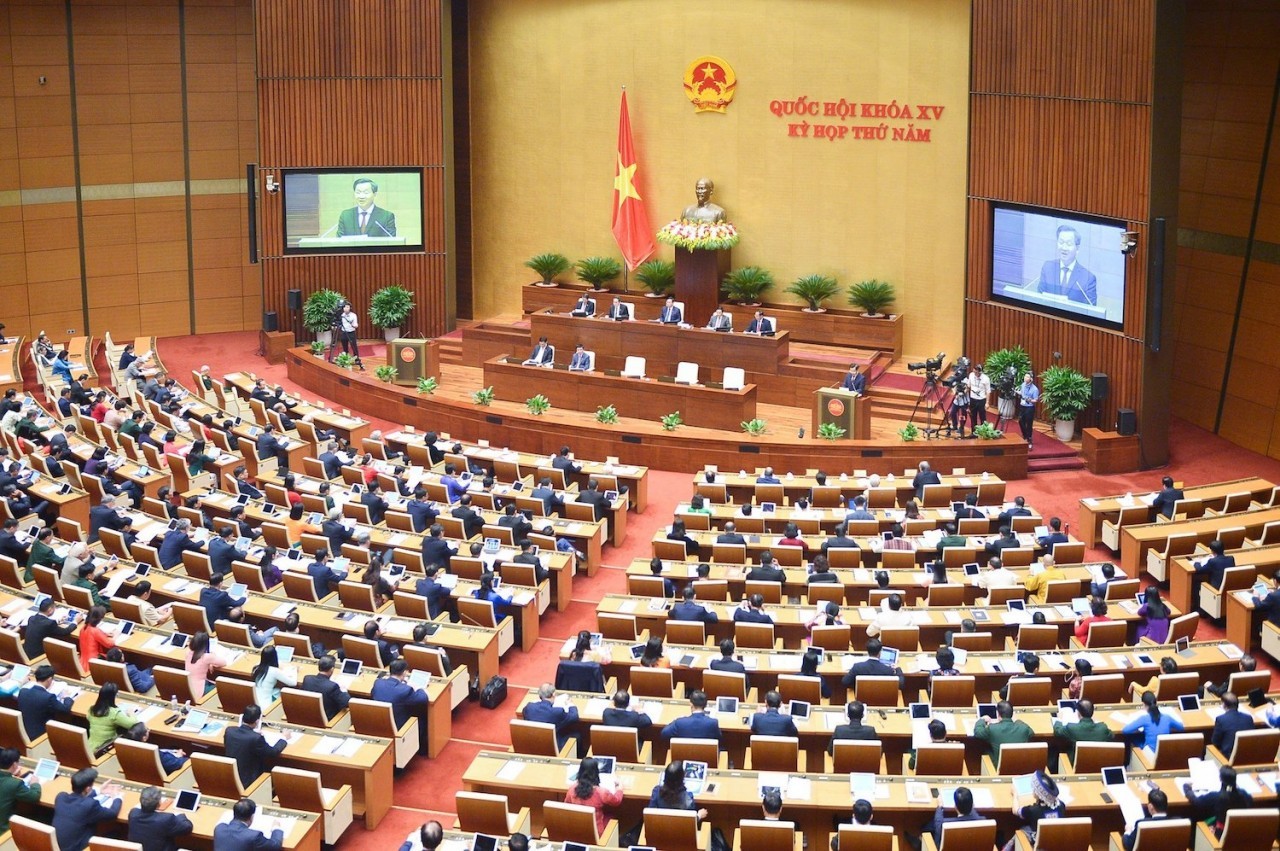Vietnam's national brand value grows the fastest in the world
According to the Deputy Prime Minister, the socio-economic situation in the last months of the year continued to recover, contributing to the overall results of the whole year 2022. The Government's comments and assessments reported to the NA at the 4th Session are quite appropriate.
 |
| The opening session of the 5th session of the 15th National Assembly |
In particular, despite the extremely difficult context, we achieved the goal of stabilizing the macro-economy, controlling inflation, promoting growth, and ensuring large economic balances; achieved and exceeded 13/15 planned targets, many of which were better than those reported to the National Assembly, such as GDP in 2022 increased by 8.02% (reported by 8%); GDP per capita reached USD 4,109 (reported by 4,075 USD); average CPI increased by 3.15% (reported by about 4%); State budget revenue reached VND 1,815.5 billion, higher than the reported number of VND 201.4 billion (up 12.5%), promptly and fully meeting the expenditure tasks on development investment, implementing social security policies, the wage reform, and other urgent tasks.
| From 2019 to 2022, Vietnam's national brand value grew the fastest in the world (up 74%), The year 2022 alone reached 431 billion USD, ranked 32nd in the group of 100 strong national brand values in the world. All three prestigious international credit rating agencies including Moody's, S&P, and Fitch, have maintained and raised Vietnam's credit rating (Moody's raised Vietnam's long-term national credit rating from Ba3 to Ba2, with a "stable" outlook; S&P raised from BB to BB+, with a "stable" outlook; and Fitch maintained at BB with a "positive" outlook). The International Monetary Fund (IMF) has identified Vietnam as a bright spot in the "gray picture” of the global economy. |
Total export turnover reached 371.3 billion USD (reported 368 billion USD); the trade surplus reached over 12.4 billion USD (reported to be about 1 billion USD). Total social investment capital reached 3,219.8 trillion VND (higher than the reported number by 18.3 trillion VND); realized foreign investment reached 22.4 billion USD, up 13.5% (reported 6.4 - 11.5%). The indicators of public debt, Government debt, and foreign debt of the country continued to decrease within safe limits (public debt ratio was 38% of GDP; Government debt was 34.7% of GDP; external debt was 36.8% of GDP).
Cultural and social fields are focused; social security is guaranteed; individuals’ living standards continue to be improved; by the end of 2022, nearly 104.5 trillion VND has been supported for over 1.41 million turns of employers and over 68.43 million laborers facing difficulties; at the same time, supplying 25,000 tons of rice, supporting 492 thousand households with more than 1.6 million people.
However, the Deputy Prime Minister also stated the limitations and difficulties of 2022, including 2 targets that have not been achieved as planned; disbursing public investment capital and implementing several policies under the Socio-economic Recovery and Development Program, three National Target Programs (NTP) have not met the requirements; planning work is still slow; and numerous businesses face difficulties. In addition, the long-term accumulated inadequacies of the real estate markets and corporate bonds have not been handled truly effectively.
The removal of impediments in legal provisions, mechanisms, policies, and bottlenecks in the performance of official duties requires more effort. Discipline is not always strict enough. Policy response and coordination remain slow, indecisive, passive, awkward, and inefficient in some cases.
Numerous major transportation infrastructure projects have been implemented by 2023
In his report for the year 2023, Deputy Prime Minister Le Minh Khai stated that while the Government is aware of additional challenges, there are opportunities, advantages, and challenges that are intertwined with one another.
To implement the Central Committee's, Politburo's, and National Assembly's resolutions and conclusions, the Government directed ministries, branches, and localities to drastically and effectively implement Resolution No. 01, focusing on maintaining stabilizing macro-economy, controlling inflation, promoting growth, and ensuring large economic balances; reviewing, supplementing, and perfecting institutions, mechanisms, and procedures.
As a result, the macroeconomic situation is essentially stable; inflation is under control, growth is promoted, and large balances are guaranteed. In the extremely difficult context, GDP in the first quarter maintained its growth momentum, albeit at a low level, reaching 3.32% over the same period. The consumer price index (CPI) tends to fall, increasing by 3.84% on average every four months. The four-month state budget revenue is estimated to be VND 632.5 trillion, or 39% of the annual estimate. The trade surplus reached 7.56 billion USD (the trade surplus came at 2.25 billion USD during the same period). Over the same period, there was a VND 15 trillion increase in public investment disbursement. National master plan and approval of numerous national, regional, provincial, and city plans are promulgated.
Plenty of major national transportation infrastructure projects are being implemented (starting 12 North-South expressway projects totaling 723.7 km; June 2023 will strive to begin construction of Ho Chi Minh City's Ring Road No3, Hanoi’ Ring Road No4; promote the progress of Long Thanh International Airport); complete and put into service 310 km of high-speed roads. Many outstanding and long-standing issues and projects were actively handled and yielded preliminary results.
However, the Government imposed existing restrictions. GDP growth in the first quarter of 2023 (reaching 3.32%) was lower than in the same period (5.03%); many localities with industrial production grew slowly or even negatively over the same period. Production and business activities are facing a lot of difficulties. Large traditional export markets are shrinking. State budget revenue tends to fall; the disbursement rate of public investment in four months is 15.65% of the year's plan, which is lower than the same period last year (18.48%).
Newly registered FDI capital fell by 17.9%, while implementation capital declined by 1.2%. The total number of newly established and resumed businesses decreased, while the number of temporarily suspended and dissolved enterprises increased. Although there have been efforts to reform administrative procedures and improve the business investment climate, they have not met the requirements. Due to the accumulation of shortcomings over many years, the corporate bond and real estate markets continue to struggle with liquidity and cash flow. Many policies from three NTP, as well as the 2% interest rate support policy, are being slowly implemented as part of the Socio-economic Recovery and Development program.
| Strive for a minimum public investment disbursement rate of 95%.
To overcome shortcomings and difficulties and effectively implement the proposed plan, the Government has clearly outlined key solutions and tasks for the coming time. It is specifically responsible for researching and recommending to the NA a plan for a global minimum tax, as well as the appropriate and effective exemption, reduction, and extension of taxes, fees, and charges. It is also essential to accelerate value-added tax refunds to help create favorable conditions for manufacturing and business activities, as well as the import and export activities of businesses. Moreover, it is important to tighten discipline; improve public service ethics; continue to improve organizational apparatus; downsize businesses; and implement salary reform. Furthermore, it is crucial to promote the disbursement of public investment, strive for a disbursement rate of at least 95% by 2023; at the same time, focus on attracting investment sources and encourage investment projects in the form of public-private partnership (PPP). Last but not least, it is vital to study and propose to the NA the separation of compensation, support, resettlement, and site clearance from the investment project to accelerate the project implementation. |


















































